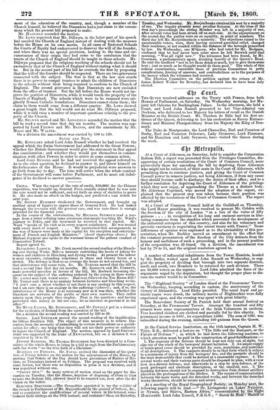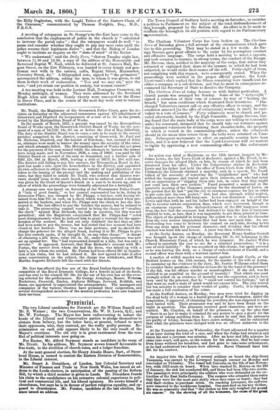44t 311ttrupulis.
At a Court of Aldermen, on Saturday, held to consider the Corporation Reform Bill, a report was presented from the Privileges Committee, dis- approving of certain resolutions of the Court of Common Council, more particularly those foe amending the bill by depriving those Aldermen who might not be reelected, of their seats in the Court of Aldermen, while permitting them to continue justices, and giving the Court of Common Council power to remove justices, not being Aldermen, if from any cause they should become unfit to discharge the duties of their office ; and to a further resolution for depriving the Court of Aldermen of the privilege which they now enjoy, of approaching the Throne as a distinct body. Mr. Alderman Copeland, who moved the adoption of the report, ex- plained that the present step was taken because their position was affected by the resolutions of the Court of Common Council. The report was adopted.
At a Court of Common Council held at the Guildhall on Thursday, the Lord Mayor presiding, it was resolved to present Mr. Cobden with the freedom of the city of London "in a box of the value of fifty guineas. . . . in recognition of his long and eminent services in libe- rating commerce from the shackles which prevented the development of the industrial enterprise of this country, and also for his voluntary and patriotic exertions in negociating the recent treaty with France." Some differences of opinion were expressed as to the advisability of this pre- sentation, when Mr. Barkley moved an amendment to the effect that the constant presentation of the freedom of the City detracts from the honour and usefulness of such a proceeding, and in the present position of the corporation was ill-timed. On a division, the amendment was lost by 79 to 34, and the original resolution agreed to.
A number of influential inhabitants from the Tower Hamlets, headed by Mr. Butler, waited upon Lord John Russell on Wednesday, to sug- gest the propriety of dividing that borough into two separate districts, north and south, two Members to be returned for each division. There are 30,000 voters on the register. Lord John admitted the force of the arguments urged by the deputation, but thought the proper place to dis- cuss the matter would be in Committee.
The "Highland Society" of London dined at the Freemasons' Tavern on Wednesday, keeping, according to custom, the anniversary of the victory of Alexandria. Lord Elcho presided. The usual loyal and pa- triotic toasts were drank, the military merits of Highlanders were fay expatiated upon, and the evening was spent with great hilarity.
The Benevolent Society of St. Patrick held their annual festival on Saturday, at the Freemason? Tavern. Amongst the hundred and fifty present were some representatives of the Irish Volunteers in uniform. Five hundred children are clothed and partially fed by this charity. Its permanent income is 950/., its expenditure 1500/. The sum of 9201. was subscribed during the evening, including 100 guineas from the Queen.
At the United Service Institution, on the 16th instant, Captain H. W. Tyler, R.E., delivered &lecture on "The Rifle and the Rampart, or the Future of Defence " ; in which he laid down the following maxims, to which attention must be paid in,the construction of good fortifications :—
1. The masonry of the fortress should be kept not only out of sight, but also out of the reach of the besiegers' distant batteries. 2. An aniple supply of bomb-proof cover should be provided for men, munitions, and materiels of all descriptions. 3. The ramparts should be in that forni'which is Subject to &minimum of injury from the besiegers' fire, and the parapets should be the least destructible that could be devised at a reasonable expense., 4. The several works and their various parts should be disposed in plan, with irview .first to a,distant defence and • afterwards to a step by step defence, of the most prolonged arid obstinate descriptimi, at the smallest cost. 5. The 'flanking defences should not be exposed to destruction from distant artillery Placed on the prolongations of the ditches. G. The means of communication between the main works and the detached works, and between the detached
works themselves, should be secure and secret. -
At a meeting of the Royal Geographical Society, on Monday next, the following papers will be read :—" Dr. Livingstone on, "Lake? Nyinyesi, or Nyassa, and Shieva,. Eastern Afriea," comm eatetr y the Right Honourable Lord John Russell, " Bard IN ktoclt!':. -Sketeli'of
the Hilly Daghestan, with the Lesghi Tribes of the Eastern Chain et the Caucasus," communicated by Thomas Hodgkin, Esq., M.D., F.R.G.S.
A meeting of ratepayers in St. George's-in-the-East have come to the conclusion that the employment of police in the church is "calculated to increase the parish rates " ; that the ratepayers would do well "to pause and consider whether they ought to pay any more rates until the police resume their legitimate duties " ; and that the Bishop of London ought to institute an inquiry on the "state of mind" of the Rector.
"We understand," said the Daily News, "that on Tuesday night last, between 11.30 and 12.30, a copy of the address of the Honourable and Reverend Baptist W. Noel, which he delivered at St. James's Hall, Re- gent Street, on the 21st February, was handed to every female and gen- tleman met with in the casinos, cafés, Regent Street, Haymarket, Coventry Street, &c." A lithgraphed note, signed by "the promoters" accompanied the address, asking the men, to whom it was given, to aid them in their work of reclamation. "You and we may sin," says the note, "and yet retain our position in society, but women cannot."
A tea-meeting was hold in the Lecture Hall, Newington Causeway, on Monday midnight, of women. They were addressed by the Reverend Hugh Allen and others. Nearly twenty were conveyed to the Home in Dover Place, and in the course of the next day were sent to various institutions.
Mr. Trail', the Magistrate of the Greenwich Police Court, gave his de- cision on Saturday on the adjourned summonses against 478 inhabitants of Greenwich and Deptford for nonpayment of a rate of Is. 3d. in the pound, levied by the Metropolitan Board of Works,
In the month of March, 1857, a precept was issued by the Metropolitan Board of Works upon the Greenwich District Board of Works for the pay- ment of a sum of 10,7231. 148. 8d. on or before the 31st of May following. The duty of the District Board was to cause a rate to be made in the several parishes comprised in the district, consisting of Greenwich, St. Paul and St. Nicholas, Deptford, and the hamlet of Hatcham ; but, instead of doing so, attempts were made to borrow the money upon the security of the rates, and which attempts failed. The Metropolitan Board of Works did not press for the payment of the sum named while the attempts to borrow the money were being made, and in November, 1858, a sum of 10001. was paid by the District Board on account of the sum so demanded, and a further sum of 650/. 12s. 104 in March, 1859, leaving a debt of 9073/. Os. 10d, still due. The district still failing to pay this amount, the Metropolitan Board in Au- gust last made a rate upon the householders in the district, and appointed its own collectors to obtain the money. A variety of legal objections were taken to the issuing of the precept and the making and publishing of the rates' but they failed to satisfy Mr. Trail, who ordered that distress war- rants should' issue, in the cases heard, but not be enforced until a decision was given by the Court of Queen's Bench in a case to be drawn up, and to allow of which the proceedings were formally adjourned for a fortnight.
A strange case was heard on Saturday at the Westminster Police Court. A "lady of good family," so her counsel represented her to be, living in Grosvenor Place, was charged by Mr. Phipps, a butcher, with having ob- tained from him 11/, in cash, on a check which was dishonoured when pre- sented at the bankers and when Mr. Phipps sent the check to her she des- troyed it. She had Offered to pay the butcher the money, but he refused to take it. The prosecuting counsel wanted to bring the charge of "stealing the check" against Miss Richards, the lady in question, but this was not permitted; and the Magistrate complained that Mr. Phipps had "acted most disingenuously when he induced him to grant a warrant for the appre- hension of the accused. He had not only withheld the fact that an offer had been made to pay the money, but had stated that her account had been closed at her bankers. There was no false pretence, and he should dis- charge the prisoner for the alleged fraud, leaving it to Mr. Phipps to give into nto custody again, if he thought fit, on any other charge." A charge of obtaining a silk dress, value 101. 5s. 2d., under false pretences, was now set up against her. She "had represented herself as a lady, but was only a servant." It appeared, however, that Miss Richards's account with Mr. Parton, the mercer from whom she had the dress, was mixed up with a lady's, with whom she resided. Mr. Parton had been offered 20/. in liquida- tion of his claim, but he had refused it. He now agreed to take it after some conversation on the subject, the charge was withdrawn, and Miss Martha Augusta Richards left the court with her friends.
Mr. Gye has offered the free use of the Royal Italian Operahouse to the committee of the Royal Dramatic College, for a benefit in aid of its funds, and has sent to the council 10/. 10s, for the use of his own box on the even- ing selected for the performance. Sir George Armytage, Messrs. Webstes, Buckstone, Creswick, Emden, Alphmus Billings, Jerwood, Reddish, and Sams, are appointed to superintend the arrangements. The managers and companies of the various theatres have promised their cooperation, and several distinguished members of the musical profession have also tendered their services.



























 Previous page
Previous page